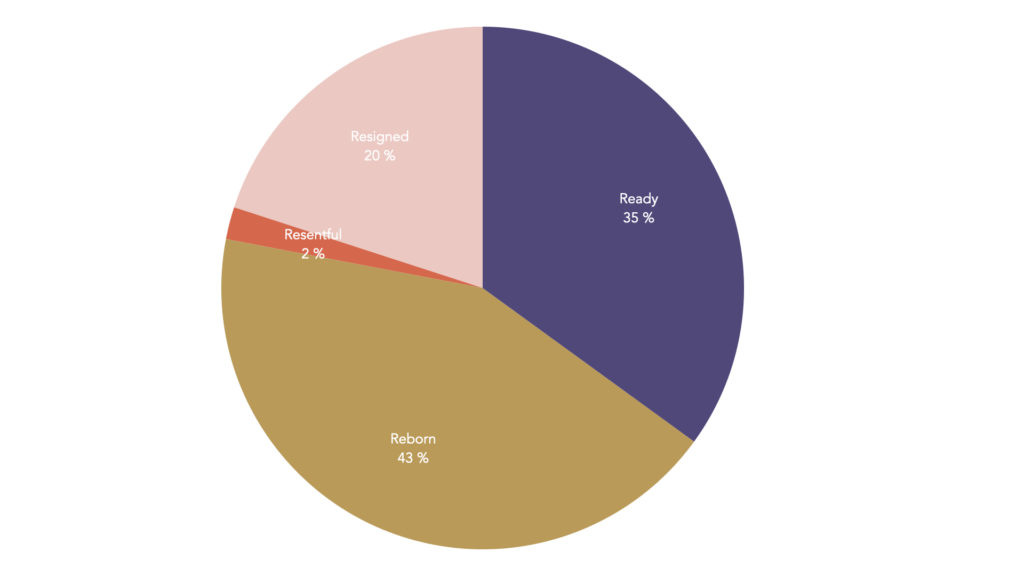
The 4 different types of Expat Partners
Expat Assignments - Who is this accompanying spouse?
In this blog post, I will paint a picture of the accompanying partner trying to summarize different study findings. It will help you to get a feeling for the wide range of personalities of the expat partners.
For a couple of years now I observe the journeys of expat partners (accompanying spouses) worldwide. Through my coachings and global coffee dates I get to meet many different types of women who all have one thing in common: They are about to join their partner on an adventure abroad or are currently living abroad triggered by their partner’s job offer.
There are several surveys and research papers that try to portrait those women and while every woman is unique I have noticed in my own research that there are most definitely certain categories most women fall into.
In this blog post, I will paint a picture of the accompanying partner trying to summarize different study findings. It will help you to get a feeling for the wide range of personalities of the expat partners. I invite you to share this post or contact me if you have anything to add. I am always happy to hear from you and learn from your own experience. In case you want to connect with other like-minded women from around the world why not join a Global Coffee Date. More info on that here but now let’s start with describing the typical expat partner.

The demographics of the expat partner
Expatriates as well as their female partners are mostly from the middle class (Braseby 2010). They live abroad for 1 to 5 years. However, in my experience, the phenomenon of the serial expat who decides to prolong or add another expat assignment is quite common. Very popular destinations are most commonly in the U.S., China, the U.K., Singapore, Hong Kong, India, and Denmark (BGRS 2012; Expat Insider 2019 Business Edition).
On average female expat partners are 43.7 years old (41% between 26-40 years old) and 39% are raising children abroad.
Although 87% of female expat partners have a university degree (bachelor’s, master’s, Ph.D.), the clear majority are not working while on assignment (Expat Insider 2019 Business Edition). Although the information on the professional situation abroad differs depending on the methodology behind the survey, most surveys speak the same language in terms of tendency and conclusions: the likelihood of female traveling partners interrupting their professional development is high. Consequently, 38% of female expat partners worry about future financial dependence on their partners (Expat Insider 2019 Business Edition).
You can find more insights on the professional situation of the expat partner in these blog posts:
Also, if you want to know more we can always arrange a free 30 minutes discovery call where I can share more about how my coaching method helps you to thrive professionally against the odds. Just send me an email to info@sharethelove.blog or fill out this short form here.
The 4 types of expat partners
Two researchers with vast experience in this topic (Dr. Moeller and Dr. Yvonne McNulty) have conducted several interviews with expat partners in the Asian Pacific. As a result, they distinguished the participants according to their attitude towards their own careers during the time of the assignment abroad.
These are the following 4 types they have concluded in their research:

READY (35% of participants)
For these pro-active Expat Partners, dual-career success often begins even before they arrive. This expat partner typically continues in her former career and refuses the prospect of being defeated by the „system“ and tries it again and again, until it will work out. Read more about the most common challenges of Expat Partners here. She is very proactive in her actions and takes her fate into her own hands. I have met many of these types of expat partners in my study for the professional female breadwinner who works and lives abroad. You can access the study for free here.
Reborn (43% of participants)
These women intended to move on with their careers abroad but faced a lot of unexpected difficulties. This expat partner usually goes through a period of frustration before she finds the power to re-invent herself. Often she enters a new career path or starts her own business. The challenge of not being able to proceed with her former life created the energy which was needed to start from scratch and to re-invent herself. In retrospect, most of these Expat Partners are glad life went that way although going through it was turbulent and not always easy to navigate. Many of my clients are in this phase of transition. If you are feeling similarly, let’s talk about it in a free discovery call.
"Reborn spouses were not immune to anger and resentment and, indeed, spoke about their journey as a rollercoaster of emotions. However, both the reborn and ready spouses felt empowered and confident and were adept at change."
Resentful (2% of participants)
These women are categorized as aggressive but defeated. This was by far the smallest group of the study. This expat partner feels stuck in the phase of frustration and doesn’t think that it will get any better. Her outlook is very negative, and hence she can’t find the positive attitude it needs to view this journey as an opportunity than as a punishment. She often stresses more negative points in the foreign culture as she interprets living abroad more as a punishment and struggles to adapt culturally.
Resigned (20% of participants)
These expat partners have given up and accepted the new lifestyle of being a trailing spouse although it was not their intention for doing so in the beginning. She acts passive and feels defeated and depressed. She thinks that she has to bow herself to her partner’s career. She is not able to value her lifestyle at the same level as one of her partners. She might decide to have children to create something valuable in her life again regardless of her former point of view of having children.
"Resigned spouses have given up and accepted the trailing spouse lifestyle. They were passive, defeated, and depressed, and saw themselves as victims of their husband's ambition to the company's pursuit of profits."
If you are feeling resentful or resigned please note that it does not have to stay like this. Please know that you are not the only one and that there are plenty of other women who have been in your shoes. Thankfully there a great coaches out there who can support you in your journey. While I focus my coaching on the question of what to do professionally, I am always happy to hop on a call to see how I or a fellow colleague with a different coaching focus can help you!
What type of expat partner are you?
I am curious to hear in what category you do see yourself. Back then in the beginning of my own experience as the accompanying partner, I was definitely in the category of reborn. Thanks to this experience I exited my former linear career path and started to be self-employed. However, I also went on the rollercoaster of emotions and struggled to make it work. I wished I had to coach back then to make this journey a bit smoother and quicker.
If you are still new in this expat adventure, what type of expat partner do you think you might become? What are you most afraid of and why?
I hope you found these insights interesting and I am a strong believer that educating yourself on the topic of expatriation and the effects on the expat partner will help you make the most of your time abroad.
If you do not want to miss out on new blog posts, I invite you to join the SharetheLove Newsletter! On a weekly basis, I am sharing about life abroad and professional adaptation. I wish you all the best in your expat adventure!











4 Antworten
Isn’t there one more category missing…? The one that embraces the experience abroad even without looking for a professional challenge? Reasons can vary, maybe she had a great career herself and is happy to slow down for a while. So shouldn’t be there a fifth category for woman who are happily the trailing spouse or family manager? Or do you think that there is always something missing in these cases?
Indeed. I think the issue here is their this is a tiny study, 30 people, and it’s unclear how they were selected. If, for example, it was based on those seeking the expat coaching services, then you’ll have a biased selection.
I think I went from the first category to the last. I struggled for years always trying and pushing with very limited success. In the end, after 10 years trying, I was burned out and had to accept that nothing will work out in the end. I feel indeed defeated. It has brought our marriage at the brink of divorce. I cannot forgive my partner for putting me through all this. The move literally has destroyed my life, my mental and physical health, my family, and my friendships.
Never put your partner through such an ordeal.
I have moved so many times over my partner’s career. 4 countries in 2,5 years. I am left struggling and apparently, MY STRUGGLES are the reason we’re having hardship in our marriage. My depression, my difficulty adapting to a new country ALL THE TIME. I am so disheartened.